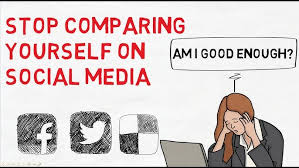In today’s world, social media is a big part of most teenagers’ lives. Apps like Instagram, TikTok, and Snapchat make it easy for teens to share pictures, post updates, and connect with friends. While social media can be fun and entertaining, it also has a negative side that affects how teens see themselves. Many teenagers start to compare their looks, lives, and achievements to the people they see online. This constant comparison can lead to jealousy, low self-esteem, and the feeling that they’re not good enough. Social media doesn’t always show what’s real, but many teenagers still base their self-worth on what they see. This shows that social media has a strong influence on how teenagers think about themselves and others.
Social media has a big influence on how teenagers see themselves and the people around them. Every day, teens scroll through apps like Instagram, Snapchat, and TikTok, where they see pictures and videos of people who look perfect, have nice things, or seem to live amazing lives. Seeing that all the time can make teens start comparing themselves without even realizing it. When all you see are people who look like they have everything together, it’s easy to feel like you don’t measure up. A lot of what’s posted online isn’t even real; it’s filtered, edited, or posted to look better than it actually is. But many teenagers forget that and start to think that’s how everyone really looks. This makes them feel bad about their own lives, bodies, or looks.
“Social media makes me feel insecure about how I look by the way people post themselves,” said Joshua Alviter Tirado.
This shows how much social media can make people question themselves and their worth.
Another reason social media causes comparison is that it turns attention into a type of competition. Teenagers care a lot about likes, comments, and followers, and those numbers make them feel either good or bad about themselves. If a post doesn’t get as many likes as they hoped, they might feel embarrassed or not good enough. Some even delete their posts if they don’t get enough attention.
That shows how much value teens place on what other people think online, Yaretzi Alvarez said, “I wouldn’t say jealous, but I’ve definitely been hurt by something I’ve seen. I’ve seen girls my age with perfect bodies, perfect lives, and it’s hard not to be upset about it. I try to remind myself that sometimes what they post is just a facade, but I can’t help but still feel hurt and maybe wish my body or life looked like theirs.”
Social media can make teens base their self-worth on what other people say instead of how they feel about themselves. This constant need for validation can cause stress, jealousy, and anxiety. It’s like everyone is trying to prove something online instead of just being themselves.
Another problem is that social media makes it look like everyone’s life is perfect. You don’t see people’s bad days or struggles, just the fun parts. So, when teens compare their regular lives to someone else’s, they start to feel like their life isn’t good enough.
“The really pretty influencers, but it lowkey motivates me to work out and be healthier”, said Moncerrath Mejia. That feeling can affect confidence and self-esteem, especially during teenage years when people are still figuring out who they are. Some teens even try to copy influences’ looks or lifestyle just to fit in, which can make them lose their sense of individuality.
In the end, social media can be both good and bad. It helps people connect and express themselves, but it also makes it easy to compare and feel insecure. Teens need to remember that what they see online isn’t always the truth. Everyone edits their posts to look better, and that doesn’t mean their lives are perfect, I asked Noelia Alderete if she thinks comparing yourself to others online can ever be a good thing and she said “I don’t think it’s a good thing because you should never compare yourself to others especially online because you don’t know what happens on the other side of the screen”, it’s important for teenagers to use social media healthily, like taking breaks, following positive accounts, and reminding themselves that their value doesn’t come from, likes or followers. If they can learn to focus on their real life instead of the online world, they’ll feel happier and more confident in who they are.








